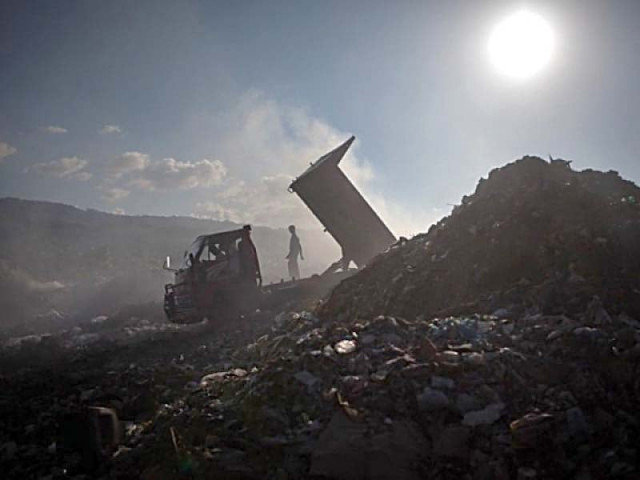Privatising garbage collection – a panacea in urban development
It, however, requires continuous post-contract monitoring from local governments

Privatisation remains a government tool that can induce fiscal responsibility while ensuring quality service to the public. PHOTO: FILE
In Lahore, two Turkish companies were awarded a seven-year contract valuing $320 million for solid waste collection, disposal and washing in 2012. After five years, the Sindh government followed suit by awarding an unknown Chinese company a $25 million contract for garbage collection in two districts of Karachi.
Garbage collection in Karachi reeks of dirty politics
On the surface, the two transactions seem similar, with the exception of contract period, certain functions and obviously the time lag between the two contracts. However, there is another caveat in the legal structuring of awarding agencies of the two cities.
In Lahore, the contract was awarded by the Lahore Solid Waste Management Company (LSWMC), an organisation established under the city government. Whereas on behalf of Karachi, the Sindh Solid Waste Management Board (SSWMB) signed the garbage collection contract with the Chinese company.
SSWMB is established under the Sindh Assembly Act, whereby it is responsible for solid waste management of urban centres spread over an area of 140,914 square kilometres with a population of 55 million.
In comparison, the mandate of LSWMC is restricted to the Lahore city, which has a population of 10 million over an area of 1,772 square kilometres.
Different models
Naturally, a question arises about the intent of the two different governance models for solid waste management in two major cities of the same country. The answer lies in varying modes of sustaining political hegemony and economic rent-seeking by the political leadership.
Karachi's garbage: Chinese firms to clean three districts
Punjab is not the paragon of devolution of power to lower echelons of the governance structure. The provincial government has effectively clipped the wings of local governments by retaining its control over service delivery at the grassroots level through bureaucracy.
However, credit is due to the provincial government on its structuring of governance of solid waste management in Lahore. It did appoint political leaders from Lahore on the board of LSWMC. Now the mayor of Lahore is directly engaged in supervising the efforts of LSWMC in keeping the city clean.
Indeed, this should be the model for replication in other cities of Pakistan, with some reforms on the fiscal policy framework.
Unique case
Against this precedent, the Sindh government is offering a unique model, whereby it is centralising a function like waste collection at the provincial level.
The irony becomes all that obvious when one sees the key role of PPP in passing the historic 18th Amendment, which revived the true federation spirit in Pakistan.
PPP has now adopted strong centralising tendencies at the provincial level, whereas it struggled against similar propensities at the federal level. These paradoxical predispositions are extracting political and economic costs from the vibrant province of Sindh.
The area of solid waste management becomes a classic example of this myopic mind-set. Privatisation of garbage collection is increasingly a popular mode being adopted by many metropolitan cities around the world.
However, in all these cities, this privatisation is managed by the city governments. It creates an onus on city governments to ensure quality service from private contractors, otherwise, they can face an axe in the next elections.
Now, in case, the political leadership is deriving its electoral strength from other locations, then its behaviour will be more of an extractive mode. We are witnessing the same in the case of Karachi.
Privatisation of municipal services requires continuous post-contract monitoring from local governments. Their responsibilities do not go up in thin air with the outsourcing of these services.
Their engagement can range from regulatory oversight to fee and billing service and contract development and maintenance.
If one talks in theory, then services provided by the local governments are those that cannot be economically provided by the market. In actual, local governments are providing these services in direct competition to the private sector.
The cost of the public sector delivery will be higher, if full cost accounting is taken into consideration.
Privatisation remains a government tool that can induce fiscal responsibility, while ensuring quality service to the public. Likewise, it may also be suggested that city governments should be involved in regulatory oversight of local utilities like power, gas and telecommunication.
In this manner, chances of regulatory capture by multibillion rupees worth of utilities may be reduced. Democracy is not the name of holding periodic elections and then forgetting about the performance till the next elections.
Five years remain a large period to make life hell or heaven for the citizens. Participatory democracy is the call of the period and it also works well for the inclusive market economy. Just need to see that whether anyone in Sindh government is lending its ears to this call.
The writer is a director in Policy Research Institute of Market Economy and can be reached at zia.banday@outlook.com
Published in The Express Tribune, February 13th, 2017.
Like Business on Facebook, follow @TribuneBiz on Twitter to stay informed and join in the conversation.



















COMMENTS
Comments are moderated and generally will be posted if they are on-topic and not abusive.
For more information, please see our Comments FAQ